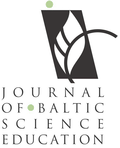PURE AND APPLIED, MORAL AND PRAGMATIC: THE PROPER WAY TO IMPROVE SCIENCE EDUCATION
| Title | PURE AND APPLIED, MORAL AND PRAGMATIC: THE PROPER WAY TO IMPROVE SCIENCE EDUCATION |
| Publication Type | Journal Article |
| Year of Publication | 2013 |
| Authors | Lakhvich, T |
| Journal | Journal of Baltic Science Education |
| Volume | 12 |
| Issue | 5 |
| Start Page | 544-547 |
| Pagination | Continuous |
| Date Published | October/2013 |
| Type of Article | Editorial |
| ISSN | 1648-3898 |
| Other Numbers | ICID: 1075973 |
| Keywords | key technologies, moral aspect, moral component, public opinion |
| Abstract | In recent years many researchers (ROSE Project in particular) have stated the Science has become one of unpopular areas of knowledge. Most students and graduates are not going to link their fates with the Science and Technology. As the result, we are facing the decline of University Science and Technology Education, as only few talented students choose Science as their priority area of their interest and even less of them decide to teach the Science in school and University. |
| URL | http://oaji.net/articles/2015/987-1425810097.pdf |
| DOI | 10.33225/jbse/13.12.544 |
| Refereed Designation | Refereed |
| Full Text |
